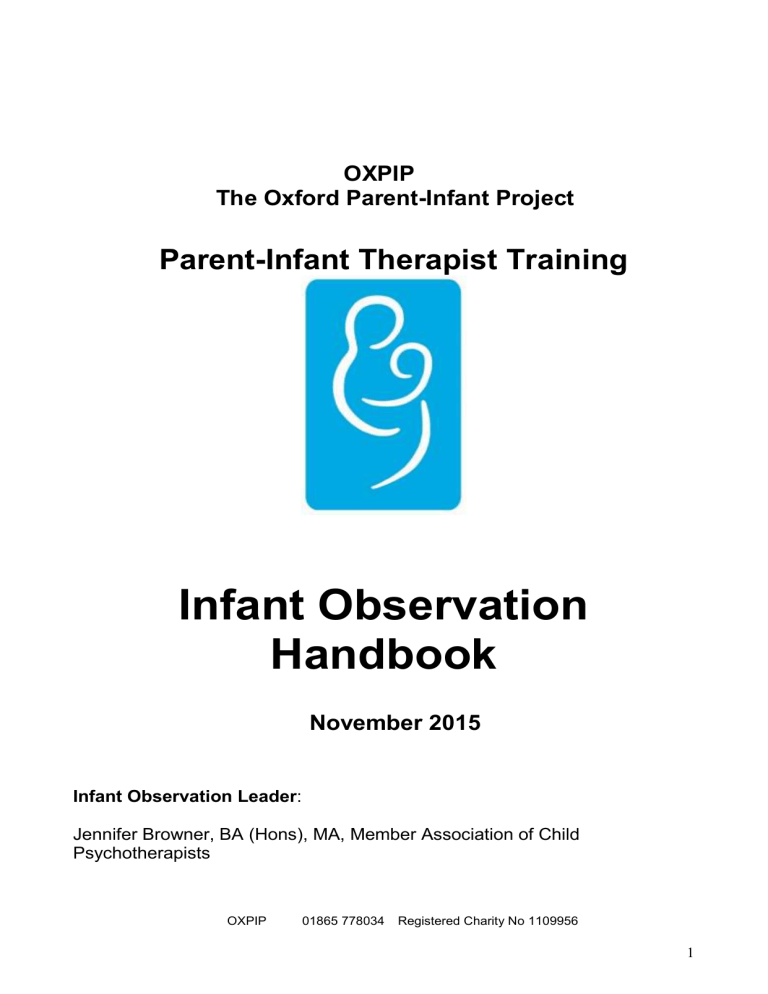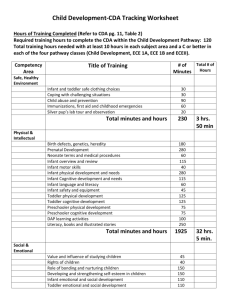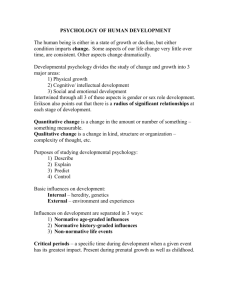Infant Observation Handbook

OXPIP
The Oxford Parent-Infant Project
Parent-Infant Therapist Training
Infant Observation
Handbook
November 2015
Infant Observation Leader :
Jennifer Browner, BA (Hons), MA, Member Association of Child
Psychotherapists
OXPIP 01865 778034 Registered Charity No 1109956
1
CONTENTS
Section 1
Ethos Of Infant Observation
Origins of Infant Observation
Nature of Infant Observation
Section 2
Pre-requisites
Assessment for suitability for the Infant Observation Training
Personal therapy
DRB
Time commitment
Letter from the Seminar Leader
Section 3
The contents of the course
1. Finding a baby to observe and the observations themselves
2. Observation seminars and writing observation notes
3. Individual tutorials for infant observation group members
4. A final essay based on the participant’s infant observation
Section 4
1. Fees
2. Assessment and Qualification
3. Codes of Ethics and Practice
4. Appeals and Disagreements
Page 3
Page 4
Page 5
Page 6
Page 7
Page 8
2
SECTION 1
ETHOS OF INFANT OBSERVATION
It has been an expectation since OXPIP began in 1998 that all its therapists will have undertaken a psychoanalytic infant observation lasting at least one and preferably two years. OXPIP’s plan to run its own Infant Observation Training has now come to fruition and began in January 2013.
All analytic work depends upon the capacities for observation, containment of one’s own responses, and the processing of and reflection upon primitive emotional experience. Infant Observation provides an excellent means through which to develop these skills.
The OXPIP infant observation course is suitable both for psychotherapists who wish to enhance their professional work by a greater understanding of the baby's early life and relationships, for those who are considering the possibility of training in psychotherapy, and for those with an interest in infant development.
Origins of Infant Observation
1
Infant observation began more than 50 years ago at the Tavistock Clinic as part of the first child psychotherapy training. Its inception and development is primarily associated with
Esther Bick. Her pioneering ideas, grounded in her observational experiences, have had a profound and enduring influence on psychoanalytic thinking about primitive emotional states in the baby. As a skilled observer of babies and as an inspiring teacher, she laid the foundations of an approach, which has provided a new and powerful way into the baby's world.
The Nature of Infant Observation
Infant observation takes place within the family. Unconscious communications are of fundamental importance. The observer's task is to seek to enter the baby's world and to observe minutely what is going on for the child within the family particularly in relation to the mother. Observers are required to open themselves to the immediate experience and, as far as possible, to leave behind existing theories and presuppositions. Countertransference responses are central to the observational process: the observer is required to register and make use of their own emotional responses as well as what they see in the relationship between mother and baby.
1 Thanks to Blythe Ellis of the Jungian Training of the West Midlands Institute of Psychotherapy for this description
3
SECTION 2
PRE-REQUISITES
Assessment for suitability for the Infant Observation Training
Applicants are expected to have established themselves in a relevant profession.
All applicants will be interviewed so that their suitability for this training can be assessed.
DBS (Disclosure and Barring Service, previously CRB)
All observers will need to have a DBS check specifically for OXPIP before beginning to observe a baby.
Time commitment
The commitment is about 2 hours a week (1 hour observation and time writing up observation notes) plus time at the observation seminars.
Letter from the Seminar Leader
The Seminar Leader will provide a letter for any student who - when searching for a baby to observe - might be requested to produce evidence that they are on a bona fide course.
4
SECTION 3
THE CONTENTS OF THE COURSE
The infant observation training has several components:
1. Finding a baby to observe and the observations themselves
2. Observation seminars and writing observation notes
3. Individual tutorials for infant observation group members
4.
A final essay based on the participant’s infant observation
1. Finding a baby to observe and the observations themselves
The infant observation involves observing a baby from birth (or as close to birth as possible) for one hour a week up to the age of one, at a pre-arranged time, within the baby’s home.
The observation of the baby will last for a minimum of three terms beginning from the term of the first observation; e.g. if the first baby observation takes place in the second term of attendance at the Infant Observation seminars, usually it would be expected to continue to the end of the fourth term of attendance at the seminars.
It is important that students do not observe members of their own family, children of close friends, colleagues, or even acquaintances. This can cause complications and interfere with the observation. It is best if students approach their GP or local Health Visitors or
Midwives for help in finding an ordinary family in which to observe. The emphasis needs to be placed on the baby’s growing relationships, capacities, and activities. These issues will be covered in depth in the initial seminar in November 2014.
Students will be expected to visit the family they are hoping to observe before the baby is born, and to arrange to see both parents at this visit if at all possible.
The observer should remain as open as they can to both what they see and what they feel during observations. The observer does not take notes during the observation, but records in as much detail as possible all that they can recall of the hours visit that pertains to the baby and their development, as soon as possible after the observation.
While observing the baby, observers should demonstrate a capacity for:
Analytic observation
Sensitivity and responsiveness to the situation
Maintaining a quiet containing presence
Thinking and reflecting on what is observed
Maintaining a professional attitude and respecting the privacy of the family
5
2. Observation Seminars and Writing Observation Notes
The 2015 seminar groups will be held monthly at the Friends Meeting House, St Giles,
Oxford, as part of the Parent Infant Therapist Training. The purpose of the seminars is to study the material of the observations. The maximum number of participants in each seminar group will be five. It is likely that 3-4 students will present an observation at each infant observation seminar. They will provide copies of the written recording of those observations for all other seminar members . It is expected that the baby’s/family’s real names will not be used.
2
The task of the seminar is to explore the emotional development of the baby in relation to his/her mother, and any other members of the family who may be present during observations. The baby’s relationship with the observer will also be thought about, as will the thoughts, intensity of feeling, and anxieties aroused in observers and seminars members. The seminar leader provides a containing presence, and helps the seminar members to pay attention to the unconscious aspects of behaviour and patterns of communication.
The observer writes the notes of the observation as soon as possible after the end of each observation, remembering as well as they can the sequence of events, with the focus on the baby in his/her setting. The observer should also notice his/her own countertransference responses, which might be informative and relevant.
Students will be expected to keep full records of each of their observations even though not all of them will be discussed in the observation seminars. This helps in building up a picture of the baby’s development week by week, and can prove vital when it comes to writing the essay on the observation experience.
3. Individual Tutorials
An individual tutorial with the infant observation leader can be scheduled during the year.
This time can be used, for example, to think about how the individual participant is finding the process of observing a baby including any problems that might have arisen, or for thinking about the content of the forthcoming final essay on the observation.
4. Final Essay
Writing an essay of approximately 5,000 words focussing on the infant observation is an integral part of the whole observation experience. This essay should be submitted by
February 2016. It is expected to demonstrate links between the observed baby within the family, psychoanalytic child development theory, and the significance of the seminar member as participant observer. Participants will discuss the requirements of this essay with their infant observation seminar leader as part of their preparation for this essay, in which the development of the baby within his or her family setting will be central.
2 With acknowledgements and thanks to the BAP Psychoanalytical Infant Observation programme for this outline of observational requirements.
6
SECTION 4
1. Fees
2. The Assessment and Qualification Process
3. Codes of Ethics and Practice
1. FEES
This infant observation training is non-profit making. The fee of £400 for the year is payable to OXPIP in advance of beginning the infant observation.
2. THE ASSESSMENT AND QUALIFICATION PROCESS
If the infant observation seminar leader has concerns that a student is failing to reach the necessary standard in the observation training she will take this up with the student
in a tutorial.
In the event of a failure to reach an agreement a report from the seminar leader and a statement from the participant may be submitted to the Training
Committee separately (see section Appeals and Disagreements, pages 8).
The decision of the Training Committee following the report will be either:
Satisfactory:
Not Satisfactory :
The observer may continue with the observation.
1.
The observer will be offered a meeting with representatives of the Training Committee.
2.
The observer may be required to leave the observation programme.
The decision of the Training Committee at the end of the programme will be either:
Satisfactory Completion: Issue of Full CPD Certificate (see 2.3, below)
Referral: Either issue of Partial CPD certificate, or resubmission of Final Paper
2.2 Infant Observation Essay
The infant observation leader will be one of two readers for the Infant Observation
Essay. The second reader will be an expert in the field of infant observation.
2.3 CPD Certificate
A Certificate of Continuing Professional Development (CPD) from OXPIP will be available for all participants outlining the elements of the one year Infant Observation that have been successfully completed.
3. CODES OF ETHICS AND PRACTICE
All participants are required to abide by the Code of Ethics and Practice of their registered counselling or psychotherapy organisation.
7




